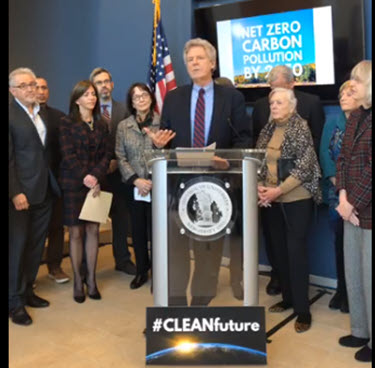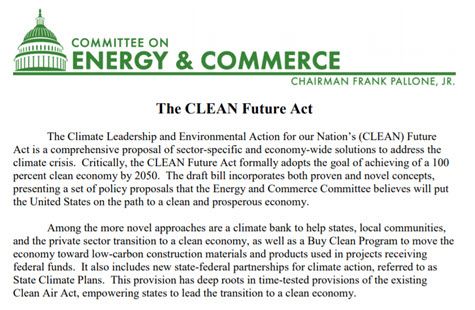
Democratic leaders on the House Energy and Commerce (E&C) Committee released a far-reaching bill on January 28, signaling their plans for climate legislation based on the outcome of next November’s elections. The bill includes rigorous efficiency targets for building energy codes and a framework to drive the U.S. electric grid toward net-zero carbon emissions. [E&C press release]
- “The CLEAN Future Act,” sponsored by E&C Chairman Frank Pallone (D-NJ) — above in photo — and Subcommittee Chairmen Paul Tonko (D-NY) and Bobby Rush (D-IL), would implement a climate policy framework announced last month. [See Roundtable Weekly, January 10] The 622-page “discussion draft” sets an overall target for a “100 percent clean energy economy” by 2050.
- The draft proposes a number of de-carbonization and renewable energy mandates and incentives affecting the real estate, power generation, transportation, and manufacturing sectors of the U.S. economy. [CLEAN Future Act section-by-section analysis]
- Commercial and residential buildings would be subject to increasingly stringent “model” energy codes for new construction and major retrofit projects. States and localities typically adopt these model codes into law, but they have authority to alter them.
- The CLEAN Future Act would require codes to reach a target for buildings to save 50 percent more energy by 2030 (relative to a 2016 baseline). The bill’s 50-percent-improvement target would not consider the expenses incurred by owners and developers to install more costly – but efficient – HVAC, windows, lighting, and other equipment in their assets. In contrast, a competing bipartisan proposal pending in the House and Senate — known as the Energy Savings and Industrial Competitiveness (ESIC) Act — would evaluate cost effectiveness and small business impacts as iterations of energy codes are developed.
- The Roundtable has long-supported the ESIC Act, sponsored by Senators Rob Portman (R-OH) and Jeanne Shaheen (D-NH), and Representatives Peter Welch (D-VT) and David McKinley (R-WV). [Roundtable Weekly, Sept. 27, 2019].
- While the CLEAN Future Act’s building-related provisions emphasize increasingly stringent energy codes, it does not impose energy consumption, carbon reduction, or “labeling” mandates on building owners that have gained traction at the state and local levels. [E.g., Roundtable Weekly, April 19, 2019]. Nor does the bill propose a “tax on carbon” as a means to cut greenhouse gas emissions.
- Other notable elements of the CLEAN Future Act include:
- Creation of a market to buy and sell “clean energy certificates,” to drive more renewable energy to the U.S. electric grid and render the electricity sector “net-zero” carbon emissions by 2050;
- New federal loan and other incentive programs to help finance microgrids and “distributed energy” projects, which would trigger Davis-Bacon prevailing wage requirements;
- Mandate connection of renewable energy facilities to the electric grid, and eliminate any monopolies in the U.S. where public utilities control all levels of production, transmission, and sale of power in wholesale electricity markets; and
- Projects supported with federal funds must “buy clean” construction materials and products that generate lower greenhouse gas emissions during their manufacture.
In addition to the CLEAN Future Act, the House’s Select Committee on the Climate Crisis is expected to release its own principles for legislation by the end of March. [Roundtable Weekly, Nov. 22, 2019].
Prospects to advance the CLEAN Future Act through Congress this year are virtually zero, as the bill does not presently align with Republican priorities in the Senate. Nonetheless, as Democrats are soliciting input on their climate framework, The Real Estate Roundtable’s Sustainability Policy Advisory Committee (SPAC) has convened a “task force” process to review the omnibus package and provide comments to the bill’s House majority sponsors.
# # #

